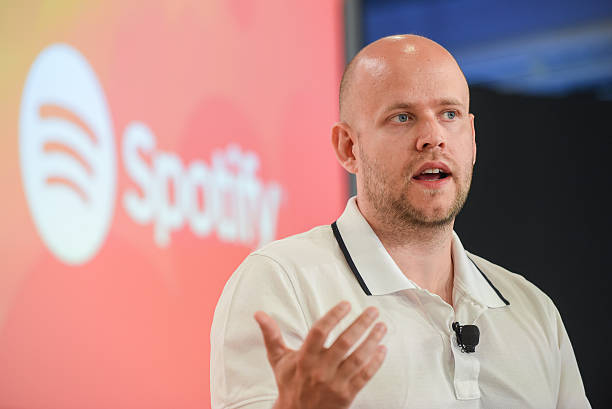In recent years, Spotify has solidified its position as the undisputed leader in the music streaming industry. With over 600 million active users worldwide and a valuation that puts it among the top tech giants, the Swedish company has revolutionized how people consume music. However, beneath this success lies a series of actions by its co-founder and CEO, Daniel Ek, that raise significant ethical concerns, particularly regarding the treatment of artists, the distribution of wealth within the company, and the broader impact on the music industry.
Massive Stock Sell-Offs Amidst Artist Compensation Concerns
In 2024, Daniel Ek sold approximately $376 million worth of Spotify stock, adding to a total of $1.25 billion in stock sales by Spotify executives and board members that year. This massive cash-out coincided with a period of financial success for the company, as it finally achieved sustained profitability after years of aggressive expansion. While corporate executives are entitled to profit from their shares, the stark contrast between their enormous personal gains and the struggles of the artists fueling Spotify’s success highlights deep ethical concerns.
Artists have long criticized Spotify for its notoriously low royalty payments, which often fail to provide a sustainable income, particularly for independent musicians. According to industry estimates, Spotify pays artists between $0.003 and $0.005 per stream. This means that a song would need to be streamed approximately 250,000 times just to earn $1,000. For comparison, an artist selling 100 physical albums at $10 each would make the same amount instantly.
Spotify’s executives argue that they are merely running a business and that artists must adapt to the new streaming reality. However, these justifications ring hollow when top management cashes in hundreds of millions while the vast majority of musicians barely scrape by.
Profitability Achieved Through Cost-Cutting Measures
Spotify’s first year of full profitability was achieved not through a fairer compensation model but via aggressive cost-cutting. In 2023 and 2024, the company laid off over 2,500 employees across multiple departments, from content curation to marketing. While layoffs are common in tech, Spotify’s decision to slash jobs while executives pocketed massive profits raises serious ethical questions.
Additionally, the company increased subscription prices across multiple regions, squeezing more money out of consumers while still refusing to improve artist compensation. The irony is that artists, who create the very content Spotify relies on, remain at the bottom of the revenue chain.
The Algorithmic Stranglehold and Its Impact on Music
Spotify has also fundamentally altered the way music is consumed, often to the detriment of artists. The platform’s algorithm-driven playlist culture dictates which songs gain exposure, effectively turning music discovery into a mechanized process favoring major labels and established stars.
Independent artists often find themselves at the mercy of these algorithms, struggling to gain visibility unless they cater to Spotify’s preferred sound—short, catchy, and playlist-friendly. This has led to accusations that Spotify is not just a streaming service but an active gatekeeper shaping musical trends. Instead of fostering diversity, it encourages artists to mold their work to fit the algorithm, reducing creative risks and innovation in favor of formulaic, stream-friendly songs.
Spotify’s Foray into AI and Its Implications
As part of its expansion, Spotify has also invested heavily in artificial intelligence, including AI-generated DJ voices and the possibility of AI-generated music. While AI can be a valuable tool, there are concerns that Spotify’s ultimate goal is to replace human artists with algorithmically generated music, cutting costs even further.
This raises major ethical and existential questions for the music industry. If streaming platforms prioritize AI-generated content over human artistry, the value of genuine musical expression could be further eroded. The potential implications are dire: fewer opportunities for real musicians, an industry dominated by computer-generated hits, and a continued devaluation of artistic labor.
Spotify’s Resistance to Fair Pay and Unionization
Unlike platforms like Bandcamp, which allow artists to sell their music directly to fans and retain a larger share of the profits, Spotify has consistently resisted any model that would increase direct artist earnings. Many musicians have called for higher per-stream payouts, but Spotify has largely ignored these demands, citing financial constraints—even as it reports record profits and its executives continue to cash out their shares.
Attempts by artists to organize and push for better treatment have also been met with resistance. Initiatives like the Union of Musicians and Allied Workers (UMAW) have demanded more transparency and better pay, but Spotify has yet to engage in meaningful negotiations. The company’s refusal to share more revenue with the very artists who make the platform valuable paints a picture of corporate greed at its worst.
Conclusion: A Platform Built on Exploitation
While Daniel Ek and his executives amass vast fortunes, the musicians who make Spotify possible continue to struggle. The company’s model prioritizes profit over fairness, favoring cost-cutting measures and algorithm-driven consumption over artist welfare. The massive stock sell-offs by executives further highlight the ethical disparity between those who run the platform and those who create the content that sustains it.
Spotify’s dominance in the music industry is undeniable, but its practices raise fundamental questions about the ethics of modern music distribution. If the platform continues to exploit artists while executives enrich themselves, the industry risks becoming a landscape where art is secondary to corporate greed. For music to thrive, streaming must become more equitable—ensuring that those who create are fairly compensated for their work, not just those who manage the platform.
The time has come for serious reform in how Spotify and similar platforms operate. Without meaningful change, the future of music could be one where creativity is stifled, musicians are underpaid, and algorithms dictate not just what we hear, but what gets made in the first place. If Spotify truly values music, it must start by valuing those who make it.

